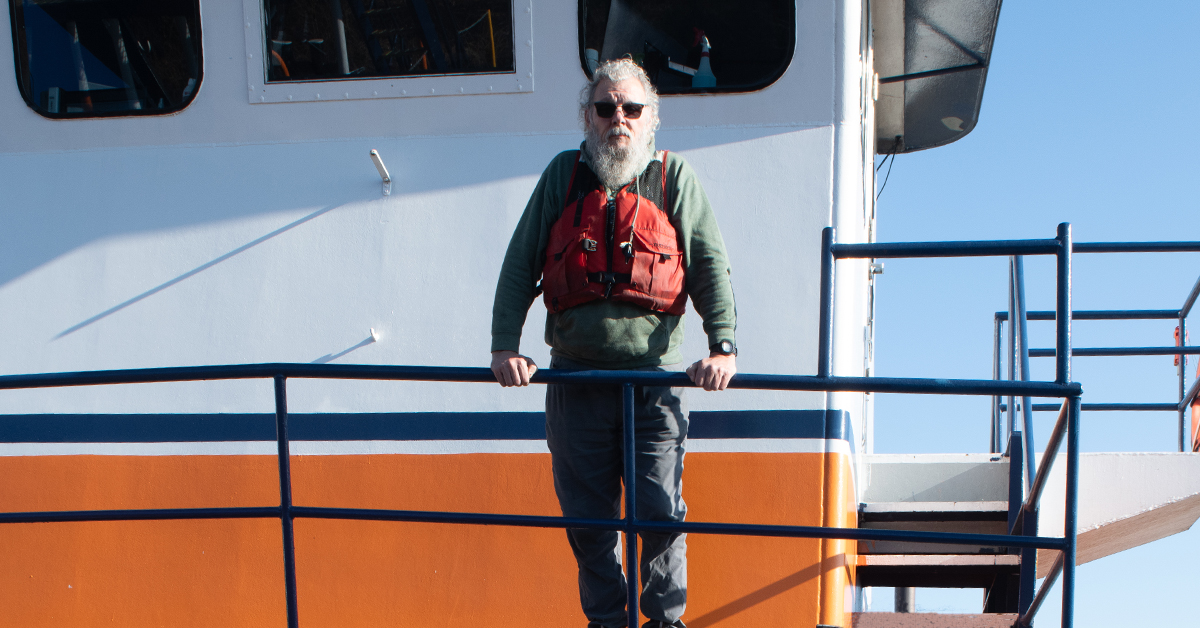When I interviewed Capt. Joe Moseley, captain aboard Turn Services’ mv. Black Beard, he was a little more than a week away from his son’s wedding.
“He’s my number three,” Moseley said. “He’s the third of seven boys, and then there’s two girls in the middle.”
This is the first wedding among Moseley’s kids. As a father of three young kids, I was eager to learn from someone farther down the parenting path than me. He shared a couple of words of wisdom.
“The boys, you don’t have to worry about them until 14, 15 and 16,” Moseley said. “Those are some hard years. At 16, you start to see a lot of change, start to see some maturing in them. But they’re going to give you a run for your money at 13, 14, 15 years old.”
Moseley said that gentleness is a key to parenting girls through their teenage years.
“My big thing that I learned, or that they taught me, is that I should always listen more than I talk,” Moseley said, “because a lot of times, they’re just looking for direction and have not rightly found their voice in how to do that.”
Moseley coupled that with another directive.
“Do that and make them understand that mom’s always number one,” he said. “That’s the best I can do.”
Moseley grew up on the west bank of the Mississippi River in a New Orleans suburb called Avondale. Moseley’s maternal grandfather, who along with his grandmother essentially raised him, worked at Continental Grain Elevator for 30 years. His grandmother worked at Schwegmann’s, a regional grocer.
Moseley went to John Curtis High School, a local Christian private school, and graduated in January at the age of 17. Staring at graduation, Moseley knew he didn’t want to go to college. One of his uncles, who worked in operations for a boat company in Morgan City, La., encouraged him to consider the maritime industry. Soon thereafter, Moseley told his grandparents what he planned to do.
“I told them, ‘I’ve made my choice on how I want to move forward since I’m not going to college,’ ” Moseley said. “He was not disappointed in that. He said, ‘OK, let’s make it happen.’ And I was on a boat probably 20 days after I finished my last day of school.”
For the first couple of years, Moseley worked offshore, but he had some friends who worked in the New Orleans harbor. One of those friends asked Moseley if he’d fill in for him one day.
“I made an ad hoc day watch for a guy and picked up on it pretty quick,” he said. “Back then, I would’ve considered myself green to that. I worked by myself, putting a couple of barges together end to end. I learned what that was all about, and I was off to the races. I was barely 19 years old.”
That was at what’s now known as Zito Fleet under the Huey P. Long Bridge. From there, Moseley went to work for Eckstein Marine sometime in 1985.
“That’s really where I cut my teeth and became really entrenched in this was the path for me,” he said. “I got to go up on the Ohio River. From there, I worked on a couple line haul boats he [Randy Eckstein] was operating for his daddy.”
Moseley said he faced some adversity in that early part of his career. In the summer of 1987, when his boat was transiting Lock 19 in Quincy, Ill., he was on the stern making the first cut through the lock when a line parted.
“I took a line to the face,” he said. “It wasn’t a blunt force trauma. It was a slap. I lost a little bit of vision over that.
“I was out of work for 10 months,” Moseley added. “I stayed with Randy Eckstein. He saw me through it. He was a very, very, very noble man.”
Once he was cleared to return to work, Moseley took the test and earned his second- class pilot license in April 1989.
“Great Lakes, inland waters, western rivers,” he said. “I took the test at F. Edward Hebert Building [in New Orleans], as old school as it gets.”
Moseley recalls that “Miss Nadine” personally typed and issued his license that day.
Moseley contrasted that to testing today.
“The difference is now everything is done online, and no one has to deal with the Coast Guard anymore, other than the application process,” he said. “All the testing today is done in facilities that teach the license.”
Moseley said he thinks that translates to a different approach to learning and practice for younger mariners today.
“I find that these guys, because there’s so much at your fingertips, they don’t have to do the work that it took for me to get that license,” he said. “At least in my mind, it’s a night and day difference.”
Leading up to that, Moseley said he was incredibly eager to learn from elder steersmen on the boats where he worked. When offshore, he would stand with a mate while the vessel was underway. Regardless of the assignment or the setting, Moseley committed to doing his job with excellence, then spending time alongside his captain.
“So after I finished my work, I’d come up and just have a conversation with him, make a fresh pot of coffee,” Moseley said. “I had enough in me and he had enough trust in me that, when I said, ‘I can do that,’ he gave me my first shot to steer the boat. There was no real book to teach. It was all just on-job training. You have to feel it and understand it. You get a couple of hard lessons, but you don’t quit, and they don’t quit.”
Moseley used climbing the stairs to the wheelhouse as a metaphor for learning his craft.
“You just keep climbing the stairs every day until you’ve worked to the degree that you can call yourself a professional, and you’ve done it enough times consistently to earn the title of being a professional,” he said.
Once Moseley had his pilot license, he went to work for Tidewater Marine, pushing a fuel flat in the New Orleans harbor. Moseley said he wanted a wide range of vessel experience, so he spent time with a variety of companies, including another stint with Eckstein Marine, Ingram, ACBL and AEP.
“AEP is where I really excelled,” he said.
With AEP, Moseley first worked on a 4,200 hp. boat, but he eventually captained an 8,000 hp. vessel. Then, when ACBL acquired AEP in 2017, Moseley made the move to Turn Services. He was first captain aboard the mv. American Pharoah. Today, he works a 7-for-7 schedule aboard the Black Beard, which serves Turn Services’ Dockside Fleet at Mile 91.5 on the Lower Mississippi River. Dockside has a 64-barge capacity. Besides moving barges in and out of Dockside Fleet, the Black Beard also services Associated Terminals’ nearby Arabi mooring buoys and Chalmette Slip and other docks in that stretch of the river.
When asked the key to his long career in the industry, Moseley praised his wife.
“It’s totally reliant on my wife,” he said. “She had to be a strong woman, and no doubt she is. And she always made it known that love is always present.”
Moseley said by that he meant that, though he missed birthdays, holidays and other special occasions, his wife was able to convey his love and presence to their kids.
“And you know, they’re all great kids,” he said. “Thank goodness there’s no resentment. But it was hard.”
Asked what message he’d send to mariners just starting out in their career, Moseley challenged them to ask questions and climb the stairs, just as he did.
Asked what he enjoys doing when he’s off the boat, Moseley said he’s into cooking.
“Today, I’m chasing the perfect brisket,” he said.
For the week-and-a-half following our interview, Moseley said he was focusing on the rehearsal dinner and taking notes for future weddings.
“Let me tell you, we’re pretty lucky to be on the groom side of this,” he said.
Brad Chauvin, vice president of boat operations for Turn Services, described what makes Moseley a standout captain.
“His professionalism comes to mind and his experience,” Chauvin said. “He checks all the boxes of what we’re looking for in someone operating our vessels. And he’s a character.”
Chauvin said Moseley is a great mentor to deckhands and also is Coast Guard-certified to train mates.
“Joe can do anything, and his love of what he does can make anyone love what they do,” Chauvin said.




